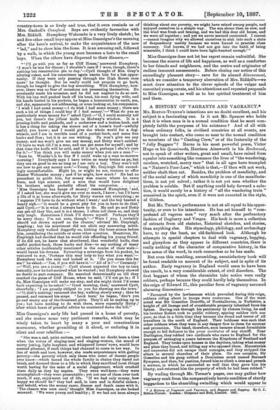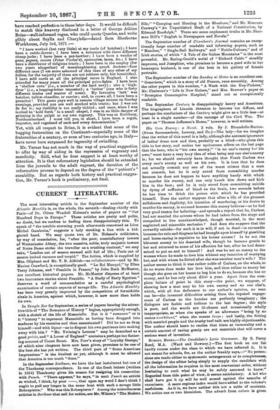A HISTORY OF VAGRANTS AND VAGRANCY.*
Ma. Ramon,Traarxit's intentions are no doubt exeollent, and his subject is a fascinating one. Is it not Mr. Spencer who holds that it is when man is in a nomad condition that be most com- pletely fulfils the purposes of his existence ? And of all with whom ordinary folks, in civilised countries at all events, are brought into contact, who come so near to the nomad condition as members of the " Canting Crew," or of the fraternity of the "Jolly Beggars "? Burns in his most powerful poem, Victor Hugo in his Quasimodo, Harrison Ainsworth in his Bookumod, not to speak of other writers, great and small, have raised from squalor into something like romance the lives of "the wandering, careless, wretched, merry race" that in all ages have trampled on "Nature's Poor-Law," which is that,—If thou wilt not work, neither shalt thou eat. Besides, the problem of mendicity, and of the social misery of which mendicity is one of the manifesta- tions, is not yet solved ; rather it is not yet seen whether the problem is soluble. But if anything could help forward a solu- tion, it would surely be a history of " all the wandering train " conceived. in the spirit, even if it were not executed in the style, of Gibbon.
Bet Mr. Turner's performance is not at all equal to his oppor- tunity, or even to his intentions. He has set himself to "com- prehend all vagrom men" very much after the perfunctory fashion of Dogberry and Verges. His book is more a collection of extracts from old statutes, Aistorical sketches, and stories, than anything else. His etymology, philology, and archaeology have, to say the least, an old-fashioned look. Although he attempts in special chapters to deal with vagrancy, begging, and gipsydom as they appear in different countries, there is really nothing of the character of comparative history, in the tree sense of the word, in such researches as he has made.
But even this rambling, scrambling, unsatisfactory book will be found readable on account of its subject, and in spite of its author. Early vagrancy in England would seem to have been the result, to a very considerable extent, of civil disorders. The first beggars of whom the chronicles take notice were really robbers, perhaps because they could hardly help themselves. In the reign of Edward IL, this peculiar form of vagrancy assumed alarming dimensions :— " Favoured by the lawlessness which prevailed daring this reign, robbers riding about in troops were numerous. One of the most noted wee Sir Gosseline Denville, of Northallerton, in Yorkshire, a knight of old lineage and of considerable property inherited from his father. Having ran through his patrimony by riotous living, he and his brother Robert took to public robbery, sparing neither rich nor poor, so that in a little time they became the dread and terror of all travellers in the north of England. Their boldness was each that other robbers when they were in any danger flew to them for succour and protection. The band, therefore, soon became almost formidable enough to bid defiance to the posse comitatus of any sheriff. Near Darlington, they robbed two cardinals who came to England for the purpose of arranging a peace between the Kingdoms of Scotland and England. They broke open houses in the daytime, taking what money and plate they found, and killing any who opposed them. Monasteries and nunneries did not escape their outrages, and they stripped the altars in several churches of their plate. On one occasion, Sir Goeseline and his gang robbed a Dominican monk named Bernard Sympson, and then, for pastime, forced him to climb a tree and preach a sermon, in which he succeeded no well that they gave him his liberty, and returned him the property of which ho had been robbed."
By wading through Mr. Turner's pages, one may gather how vagrancy sank from the comparatively heroin condition of sturdy beggardom to the shambling swindling which would. appear to
• A History of Vagrants sad Vsgrassoy, and Beggars and Bogging. By O. J. Itibteu-Turner. London Chapman and Hall, Limited. 1887.
have reached perfection in these later days. It would be difficult to match this knavery disclosed in a letter of George Atkins Brine—well-informed rogue, who could quote Quarles, and write glibly about Scylla and Charybdis—dated from Sherborne Workhouse, July 3rd, 1871 :--
" I have worked (but very little) at my trade (of butcher) ; I have been a cattle-drover; I have been a salesman with three different cheap-jacks; I have been a pot-hawker; I have been a vendor of pens, papers, razors (Peter Pindar's), spectaeles, laces, Sm.; I have been a distributor of religions tracts ; I have been in the employ (for two years altogether) of manslanghtering quack doctors—four different ones (I am more ashamed of this than of any other of my follies, for the majority of them are not robbers only, but homicides). I have sold cards at all the principal races in England. I also attended for many years all the principal prize-fights. I have been a 'shallow cove' (i.e., a member of the land navy) ; also a ' high.
flyer ' a begging-letter impostor) ; a 'larker ' (one who is forty different trades and master of none). My favourite ' lark' was butcher, tallow-chandler, or carrier; and, to crown all, I have been a preacher ! This game pays well in remote village streets on Sunday evenings, provided you are well stocked with tracts ; but I was not fit for it ; my risibility is too easily tinkled ; and once, when I was invited to ' hold forth' in a email chapel, I was in no little danger of grinning in the pulpit at my own roguery. This was at Rothbury, Northumberland. I must tell you, in short, I have been a rogue, impostor, and vagabond of each and every denomination."
Yet, with all respect to Brine, it is evident that some of the
begging fraternities on the Continent—especially some of the fraternities of a century, or even of two centuries ago, in Italy— have never been surpassed for ingenuity of swindling.
Mr. Turner has not much in the way of practical suggestion to offer by way of aiding in the repression of vagrancy and mendicity. Still, what he does suggest is at least worthy of attention. It is that reformatory legislation should be extended from the juvenile to the adult vagrant, the duration of the reformative process to depend on the degree of the " patient's " curability. Bat as regards both history and practical sugges- tion, Mr. Turner's book is preliminary, not final.



































 Previous page
Previous page